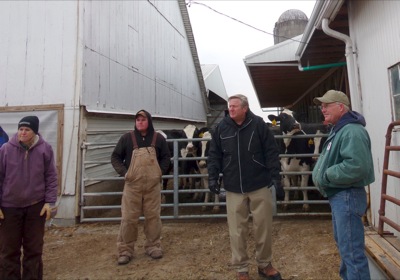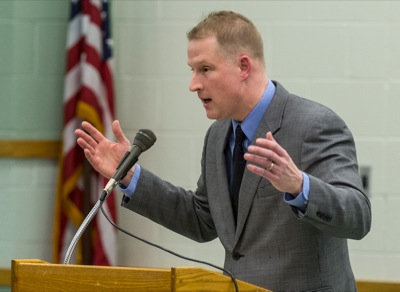Wednesday, March 26th, 2014
Ag tour highlights watershed practices
By Nancy Allen

Photo by Nancy Allen/The Daily Standard
Numerous local, state and federal officials toured two farms in the Grand Lake Watershed on Tuesday to view conservation practices designed to reduce nutrient runoff. From left are Theresa Dirksen, an engineer at the Mercer soil and water office, Jason Homan, farmer, Jim Zehringer, director of the Ohio Department of Natural Resources, and Bob Homan, owner of the farm toured.
Two ag operations were lauded during a tour Tuesday highlighting changes farmers have made to improve water quality in the Grand Lake Watershed.
"There's no better place than Mercer County to celebrate National Agriculture Day," said Jim Zehringer, director of the Ohio Department of Natural Resources, during a stop at the Dahlinghause farm on Depweg Road south of Celina. "We all have a common goal to keep nutrients out of our streams and rivers and our great Grand Lake and keep nutrients on the ground."
The Dahlinghaus farm and the Homan farm on state Route 119 west of Maria Stein have installed various conservation practices and structures in recent years, including feed lot covers that prevent manure from mixing with rain and running off, holding structures to store livestock waste longer to avoid wintertime application, and filter strips that reduce the amount of soil and nutrients getting into waterways.
In January 2011, the state designated the 58,000-acre watershed distressed after humans and animals were sickened by blue-green algae toxins in the lake in 2010. The state has placed water advisories on the lake the last five summers due to unsafe toxin levels. The algae is fed largely by phosphorous, most of which runs off farmland, the largest land use in the watershed. The distressed designation triggered new rules for watershed farmers, including a requirement that they complete nutrient management plans, stop applying manure during winter months and others.
"One hundred fifty four watershed farmers now have nutrient management plans," Zehringer said Tuesday.
Watershed farmers were required to get the plans by Dec. 17, 2012. All but one, Gary Homan of St. Henry, has. His case has been referred to the Ohio Attorney General's Office for possible action. No information was available at press time on the status of that case.
"Over the years, one thing led to another," said farmer Mark Dahlinghaus on installing conservation practices. "Every year we learn a little more."
Practices the Dahlinghaus family has installed at their farms include receivers for milkhouse wastewater, covers for a compost and feed lot, manure storage, filter strips and cover crops. The farm also uses variable rate manure application technology to apply manure only where soil tests show it is needed.
Dahlinghaus and his brother, Paul, bought a truck to transport cattle and turkey manure to fields further away and moved livestock closer to fields where they can apply the waste.
State agriculture engineer Terry Mescher, who works with watershed farmers on conservation needs, said state officials are promoting dry manure storage.
"Over the years there's been a lot of liquid storage and we've seen a lot of manure (applied) over a shorter period," Mescher said. "If we can go to more dry storage and put covers over them, the better."
Homan has installed covers over a feed lot for heifers and a dry manure storage area. He also practices no-till farming in conjunction with planting cover crops, which reduces soil and nutrient runoff and improves soil structure. He applies manure to his growing cover crops, which take up the nutrients. He uses the cover crops to feed to his dairy cattle.
"We've always soil tested," Homan said. "My dad did it before me."
Mercer County Commissioner Jerry Laffin noted he is seeing "more sensitivity" from farmers regarding water quality.
"It didn't happen overnight and it takes a lot of planning," Laffin said of changing farming practices. "People are working on it, but it takes time."
Milt Miller, manager of the Lake Restoration Commission, said the commission's relationship with farmers is not adversarial.
"We realize they (watershed farmers) have met the challenges with the practices they have installed," Miller said. "It's unfortunate that it was a problem that caused this, but it's all about finding solutions and partnerships."


